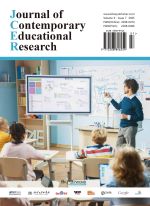Abstract
The paper aims to examine the application of multimedia technology in expanding vocabulary in second language acquisition. Incorporating innovative technology such as mobile applications, gaming applications, websites, and other related online tools has increased learners’ vocabulary mastery, engagement, and motivation levels. Interactional processes like media-embedded objects, teach-learning capacity algorithms, and feedback help learners receive the course in a personalized way that considers individual learning patterns or abilities. However, there are the following challenges: accessibility issues, total reliance on technology, and issues related to privacy. The following challenges affecting learning that arise from using gadgets: the digital divide, limited device access, and environmental issues that may distract a learner in a technology-enabled environment. Moreover, the security issue for data and the ethical question of users’ information remain important too. Hence, the paper provides arguments that although these technologies contribute significantly to vocabulary acquisition, the challenge that emerges should be addressed by integrating technology in teaching and learning alongside conventional methods for vocabulary acquisition, which is a practical language acquisition tool that should not be monopolized.
References
Robin SJ, Aziz A, 2022, The Use of Digital Tools to Improve Vocabulary Acquisition. International Journal of Academic Research in Business and Social Sciences, 12(1): 2472–2492.
Babazade Y, 2024, The Impact of Digital Tools on Vocabulary Development in Second Language Learning. Journal of Azerbaijan Language and Education Studies, 1(1): 35–41.
Ravshanovna KL, Ogli HRA, Xasanovich XR, et al., 2024, Digital Technology Integration for Improving Foreign Language Learning. Eurasian Journal of Technology and Innovation, 2(1–1): 188–191.
Gavranovic V, 2019, Second Language Vocabulary Acquisition Enhanced by the Use of Technology, Sinteza 2019-International Scientific Conference on Information Technology and Data Related Research, Singidunum University, 621–626.
Guarnieri S, 2024, Fostering Vocabulary Acquisition and Enhancing Metacognition through Digital Tools and Playful Teaching: A Case Study on Italian L2 Learners, Master’s thesis, Ca’ Foscari University.
Lorenset CC, Tumolo CHS, 2019, Vocabulary Acquisition in English as a Foreign Language: Digital Gameplaying The Sims. Revista Linguagem & Ensino, 22(4): 1002–1019.
Alharthi M, Bown A, Pullen D, 2020, The Use of Social Media Platforms to Enhance Vocabulary Development in Learning a New Language: A Review of the Literature. Arab World English Journal (AWEJ) Special Issue on CALL, (6).
Merzifonluoglu A, Tulgar AT, 2022, Are Digital Technologies Effective for the Improvement of L2 Vocabulary at Tertiary Level. The Reading Matrix: An International Online Journal, 22(1): 56–72.
